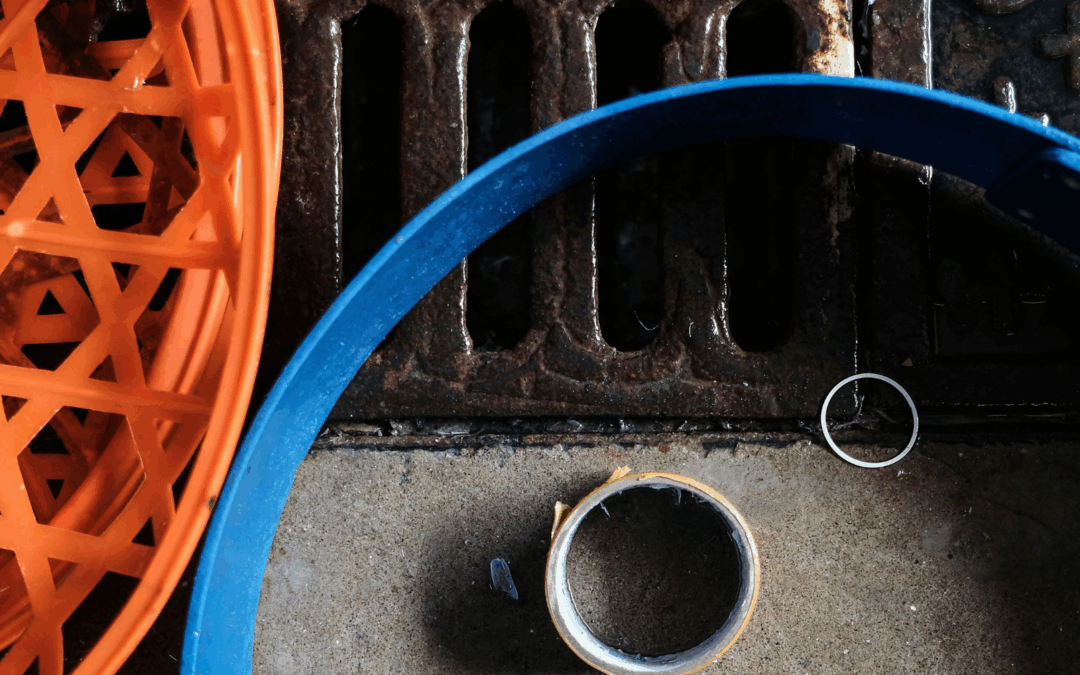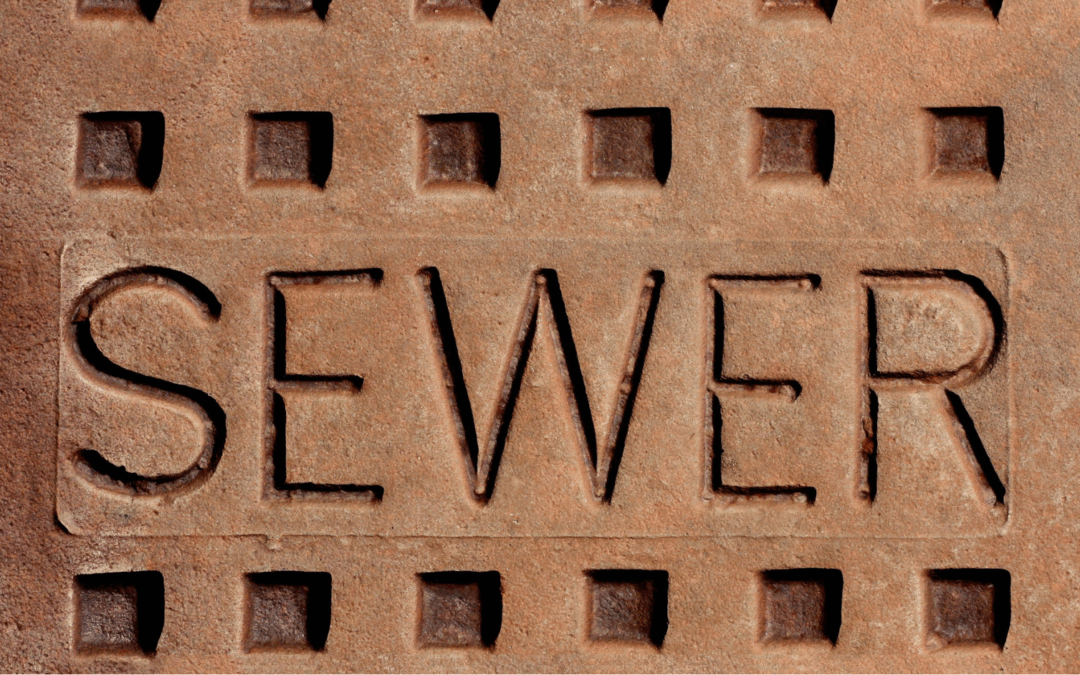Have you wondered what is a tankless water heater?
The unassuming water heater, a staple of every home, is the unsung hero that grants us the luxury of a warm shower, sparkling clean dishes, and sanitized laundry. But in the realm of water heaters, there’s an innovator that’s rewriting the rules of heating; the tankless water heater.
If you’re a homeowner aiming for an all-season efficiency upgrade, then this detailed exploration of tankless water heaters is your recipe for comfort and savings.
Schedule Service Online
Get a free estimate so you know what you're signing up for
"*" indicates required fields
For Emergency Services Call: 410-255-9300
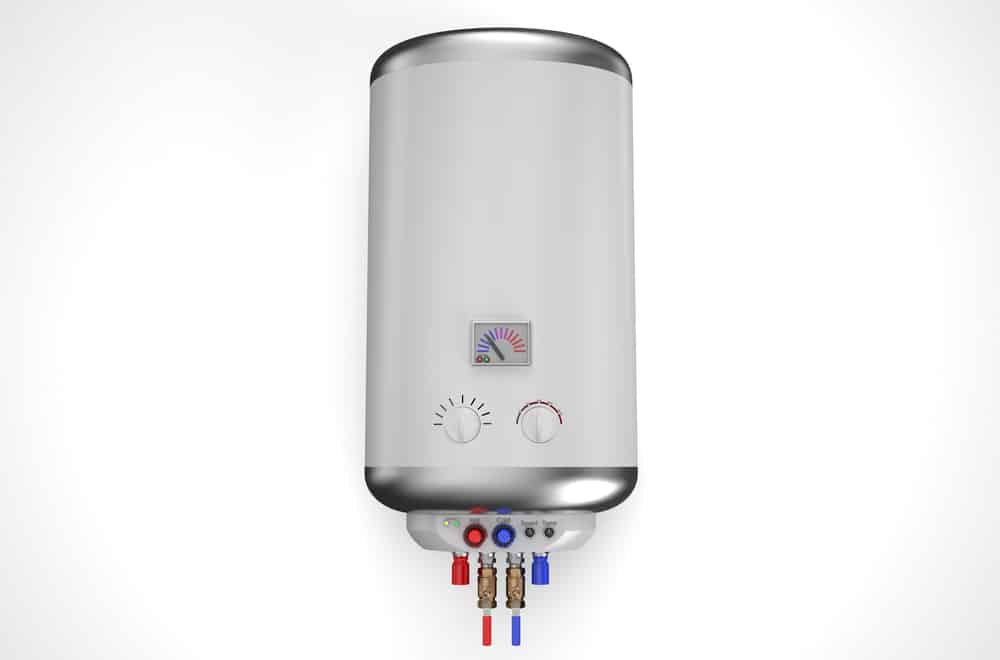
Electric boiler, water heater isolated on white background
What is a Tankless Water Heater?
A tankless water heater, often referred to as an on-demand water heater, represents a significant leap forward in home heating technology. Unlike traditional water heaters that store and constantly heat water in a large tank, tankless variants heat water directly as it flows through the device.
This means water is heated only when needed, eliminating the standby energy losses associated with tank storage models and providing an endless supply of hot water. The mechanism involves water flowing through a series of high-efficiency heating elements or gas burners that activate upon demand, ensuring that hot water is always available without the wait or waste of resources.
This innovative approach to water heating not only offers greater efficiency but also contributes to a more sustainable lifestyle, reducing the overall energy consumption of a household.
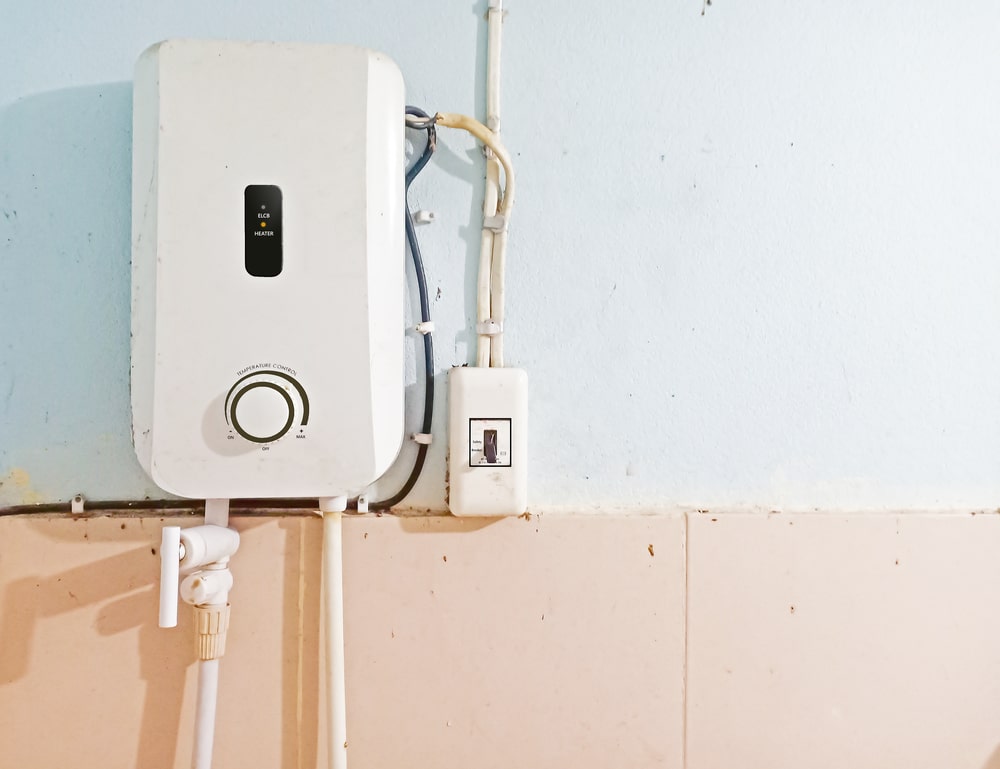
White instant water heater installed with circuit breaker on the wall of bathroom with free copy space. Safety first concept.
Tankless Water Heaters Unplugged: What’s All the Buzz About?
In a world that’s waking up to the reality of limited resources and environmental sensitivities, tankless water heaters shine as a sustainable solution.
Unlike the conventional storage-tank water heaters, which heat and reheat water throughout the day, tankless, or “on-demand” water heaters, activate only when hot water is called for. This revolutionary approach initiates a constant heating cycle, meaning you’ve got a hot water genie waiting to serve you at your whim.
But what’s the real appeal to the average homeowner?
The Efficiency Edge
Beyond the comforting appeal of instant hot water, tankless systems offer the promise of energy efficiency, potentially slashing your utility bills. Since there’s no tank to constantly keep hot, tankless water heaters can be up to 34-50% more efficient than traditional tank heaters.
They can recover hot water almost twice as fast as their old-fashioned counterparts, and being “on-demand,” they waste less energy since they don’t keep a large amount of water heated unused while you’re off at errands or asleep.
Life Space And Lifespan
Tankless units are also known for their longevity, often living up to 20 years or more, compared to the 10-15 year lifespan of storage-tank heaters.
Plus, with a sleek, wall-mounted design, they save substantial floor space, a precious commodity in any home. The cluttered closet and hallway no longer need to house a behemoth water tank.
Continuous Comfort
Perhaps one of the most immediate benefits is their ability to deliver continuous hot water.
They’re adept at handling multiple and consecutive hot water demands, ensuring everyone in the household can enjoy showering or bathing without having to worry about who used all the hot water.
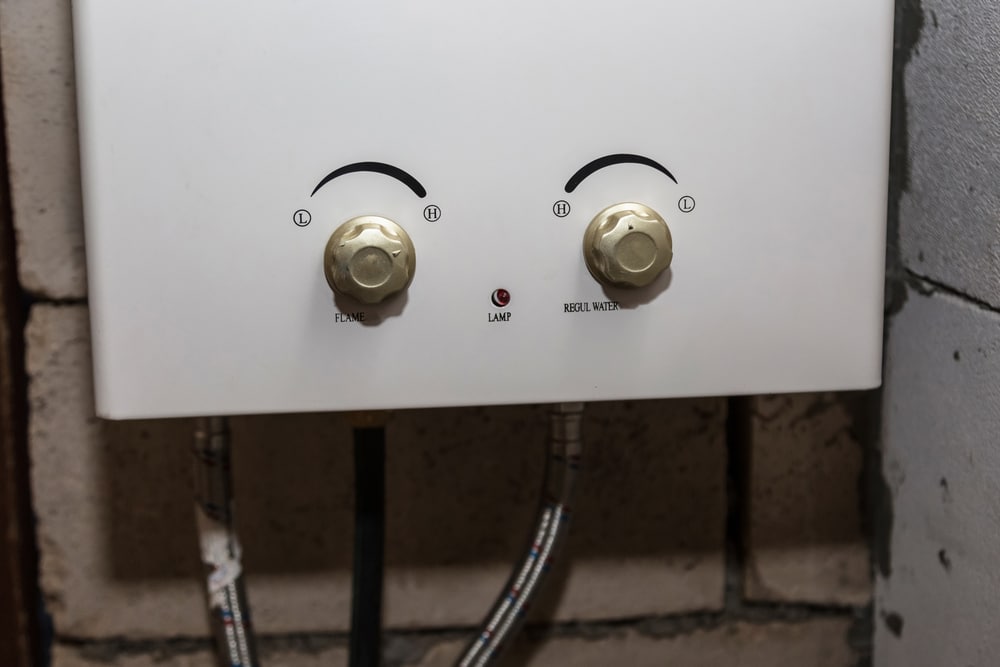
Types of Tankless Water Heaters
When contemplating the switch to a tankless water heater, it’s crucial to understand the different types available on the market.
Each type caters to specific needs and preferences, ensuring that homeowners find the best fit for their household requirements. Here’s a glance at the primary categories:
Electric Tankless Water Heaters
Electric models are known for their compact size and relatively straightforward installation process. They’re an excellent choice for households focusing on indoor installations due to their zero emissions.
Ideal for smaller homes or point-of-use applications, electric tankless heaters can provide hot water for sinks and showers efficiently.
Gas Tankless Water Heaters
A gas tankless water heater, on the other hand, is suited for homes with higher hot water demands. These models require venting but are more powerful, capable of delivering a higher volume of hot water faster with natural gas.
They’re often recommended for heating water in larger households or properties with multiple bathrooms.
Condensing Tankless Water Heaters
Condensing tankless water heaters represent a significant advancement in tankless technology, catering especially to homes with high hot water demand.
These sophisticated systems utilize a dual heat exchange process; they not only use the heat from the combustion process to heat the water but also capture additional heat from the exhaust gases, which would otherwise be wasted. This process makes condensing tankless water heaters even more energy-efficient than their non-condensing counterparts.
Due to their advanced design, condensing units can achieve an astonishing 90-98% energy efficiency rating, offering substantial savings on utility bills over time. They’re slightly larger and more expensive upfront than non-condensing models but make up for this with lower operating costs and a reduced environmental footprint.
Ideal for larger homes or those looking to maximize energy efficiency, condensing tankless water heaters are a future-proof choice for anyone looking to upgrade their home’s hot water system.
Outdoor vs. Indoor Installations
Tankless water heaters can also be categorized based on their installation location. Outdoor models eliminate the need for venting but are designed to withstand the elements.
Indoor units, while requiring venting, save precious outdoor space and are not exposed to weather conditions.
Point-of-Use vs. Whole-House Systems
Point-of-use tankless water heaters are installed near where the hot water will be used, such as under a kitchen sink, providing hot water directly to that location without delay. Whole-house systems, conversely, are built to supply hot water to the entire home, requiring a more powerful and often more costly setup.
By understanding the types of tankless water heaters available, homeowners can make an informed decision that aligns with their specific needs, ensuring endless hot water for all seasons.
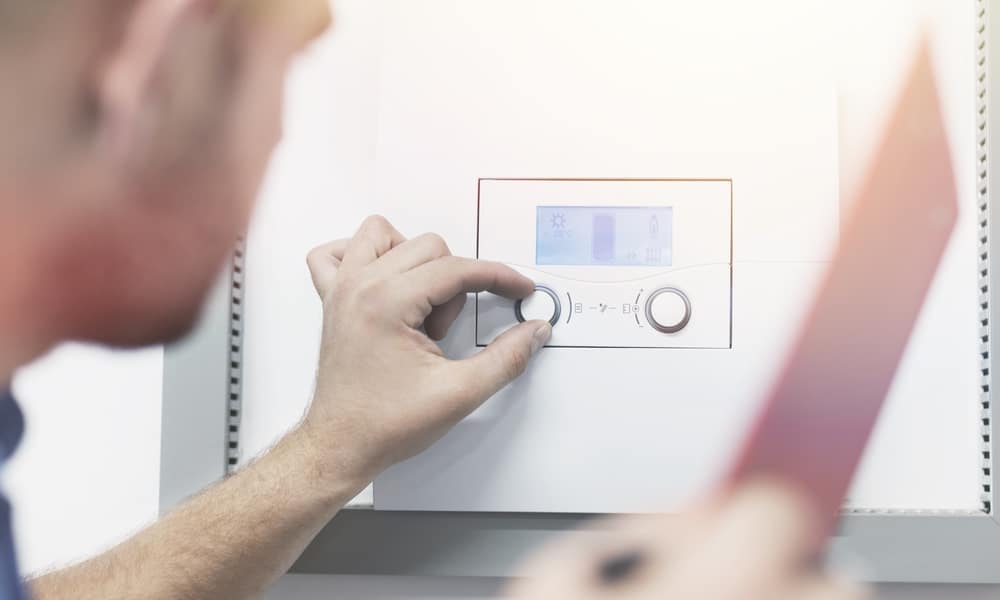
Nuts and Bolts: How Tankless Water Heaters Work
Understanding the inner workings of tankless water heaters unveils the science behind their efficiency. When you turn on the hot water tap, cold water travels through a pipe and into the unit, where a gas burner or an electric element heats the water. The heat exchanger comes into play, transferring the heat produced by the burner or element to the water, raising its temperature on the way out. This entire process occurs instantly, saving the time and energy required to heat a storage tank of water.
Saving Energy, One Drop at a Time
This process is significantly more energy-efficient than traditional tank systems, which must reheat water in order to maintain a set temperature. There’s no standby heat loss with tankless, making it a standout choice for homeowners seeking to reduce their carbon footprint.
Sizing up for Success
Sizing a tankless water heater is crucial. It must be appropriate for your household’s needs; too small a unit and you’ll end up with lukewarm water on a chilly day, too large and you’ll pay for capacity you won’t use. A professional assessment is the key to ensuring you purchase and install the right size for your home’s water use patterns.
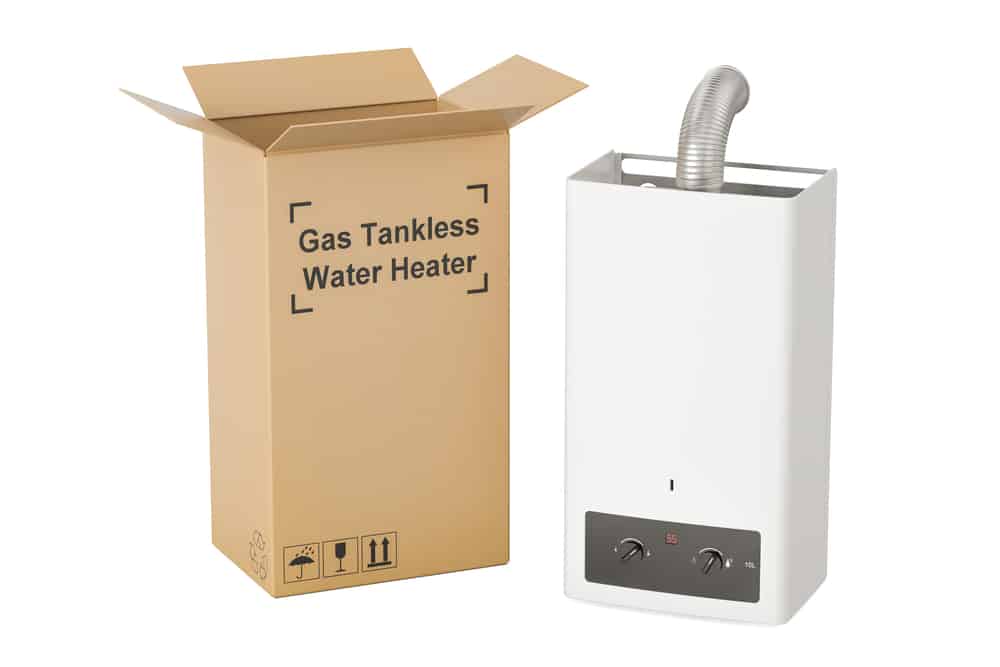
Gas tankless water heater with cardboard box, delivery concept. 3D rendering
Making the Switch: Installation and Maintenance
The switch to a tankless water heater is not just a change in appliance, but a transformation in home comfort. The installation process can vary based on fuel type, the size of the unit, venting, and plumbing requirements, making it a job best left to experienced professionals.
It’s an investment in your home, and a correctly installed unit ensures both safety and performance.
The DIY Dilemma
While intermediate DIYers might be comfortable taking on some plumbing projects, installing a tankless water heater is usually not one of them.
Gas-related tasks and many of the heater’s elements call for expert handling.
Preserving Perfection: Tankless Water Heater Maintenance
To keep your tankless water heater in prime condition, a maintenance routine is essential. Without the regular tank flushing or replacing sacrificial anode rods required by standard water heaters, you may wonder what a tankless system needs.
The answer lies in regular descaling, particularly for those in areas with hard water, and inspecting and cleaning the inlet water filter. This simple vigilance enhances efficiency and ensures a long, uninterrupted service life.
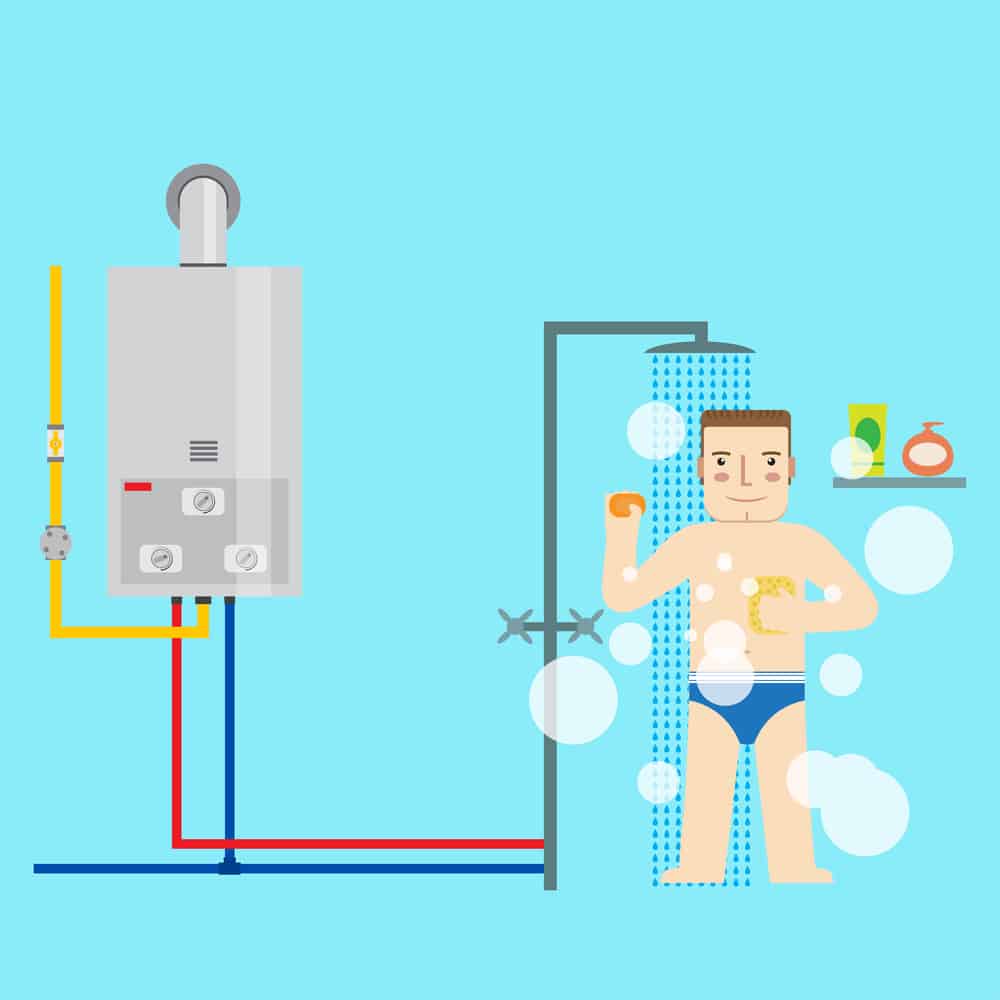
Gas water heater and man in the bathroom taking a shower. Flat icon for web design and application interface, also useful for infographics. Vector illustration.
Efficiency Showdown: Tankless vs. Tank Style Water Heaters
A detailed comparison of tankless and traditional water heaters sheds light on the decision-making process.
Both systems have their benefits and drawbacks, and settling on the most suitable one for your home requires a deep-dive into factors such as upfront costs, installation complexity, and long-term savings.
Energy Efficiency
Tankless water heaters win the day in efficiency hands-down. Traditional water heaters are constantly using energy to keep that water hot, regardless of whether you’re using it or not.
In contrast, tankless only use energy to heat water when a hot water tap is turned on. This distinction can lead to significant savings over the long term.
Initial Costs and Long-Term Savings
While the initial purchase and installation costs of a tankless water heater is typically higher than that of a traditional water heater, the potential for long-term savings through reduced energy costs often justifies the investment over time.
It’s a financial equation that each homeowner must weigh against their household’s water usage and budget. Tankless water heater ranges in prices, so prinding the right one for you is vital for keeping the initial costs as low as possible.
Environmental Impact
In an age where personal environmental stewardship is paramount, the reduced energy consumption of tankless water heaters offers a notable eco-friendly advantage.
By using less energy, tankless systems help reduce your carbon footprint, which is a win for both your conscience and the planet.
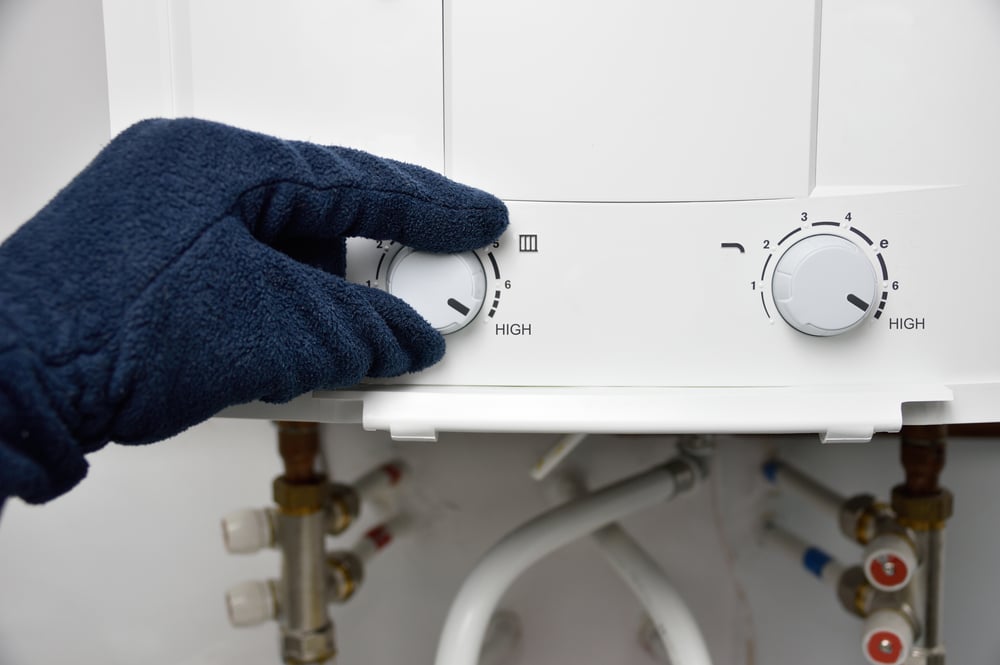
hand rotate temperature adjuster of water heater.High temp
The Tankless Water Heater Shopping Guide
If you’ve been convinced that a tankless water heater is the right fit for your home, the shopping process begins.
But with a variety of models and features in the market, what should you look for to ensure the best selection?
Your Home’s Water Needs
Assess your household’s peak water usage and how many appliances or faucets you often use simultaneously.
This will determine the size and output temperature rise your tankless water heater will need to meet those demands.
Fuel Type and Availability
Consider which fuel types are available in your area and their respective costs.
Longevity and Warranties
Look for tanks with a warranty that meets your longevity expectations.
Energy Efficiency Ratings
Ensure the chosen model is ENERGY STAR certified, signaling that it meets high efficiency standards.
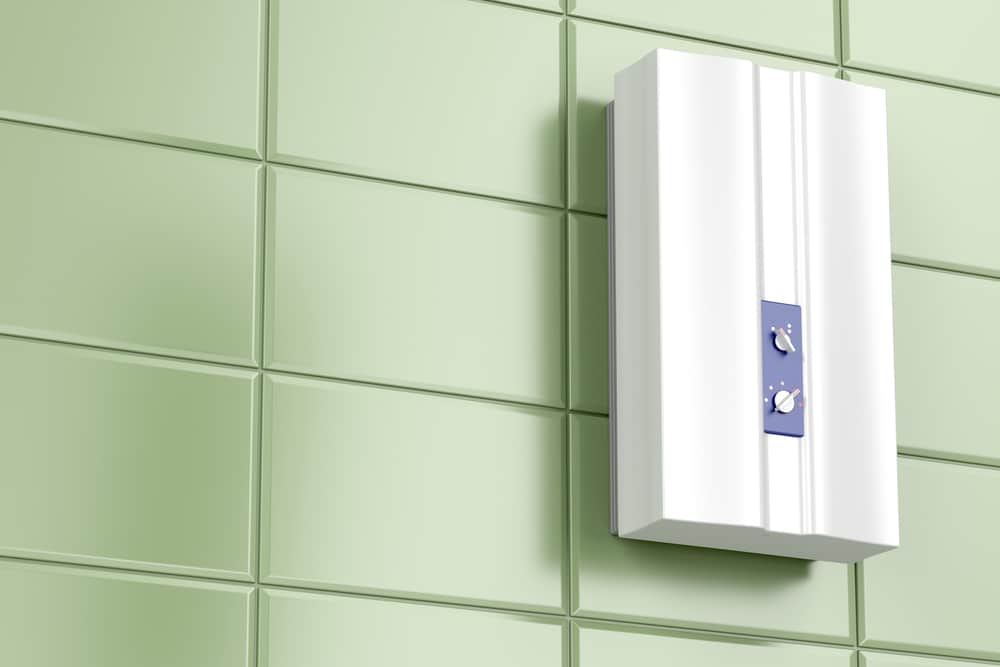
Tankless water heater in the bathroom
The 10 Best Tankless Water Heaters for Your Home
When it comes to choosing a tankless water heater, the market is filled with outstanding options that cater to different needs and preferences.
Here’s a curated list of the 10 best tankless water heaters, known for their efficiency, reliability, and performance:
- Rinnai RUR Super High Efficiency Plus – Features comprehensive home coverage, WiFi capabilities, and simultaneous appliance use support.
- EcoSmart ECO 27 Electric Tankless Water Heater – Offers impressive energy savings and is ideal for colder climates where incoming water temperatures can drop.
- Navien Premium Condensing NPE-240A Tankless Gas Water Heater – Renowned for its efficiency and eco-friendly low NOx emission technology.
- Stiebel Eltron Tempra 29 Plus Electric Tankless Water Heater – Boasts advanced flow control to ensure constant temperature output.
- Rheem Performance Platinum Gas Tankless Water Heater – Offers high efficiency and easy remote management via Rheem’s exclusive EcoNet Wi-Fi technology.
- Noritz NRC66DVNG Indoor Condensing Direct Tankless Hot Water Heater – Provides an optimal blend of efficiency and performance, with an environmentally friendly Low NOx design.
- Bosch Electric Mini-Tank Water Heater Tronic 3000 T 4-Gallon (ES4) – A compact and reliable option for smaller spaces or point-of-use applications.
- AO Smith Signature 240V 28kW Electric Tankless Water Heater– Distinguished for its digital temperature control and self-modulating technology.
- Takagi T-KJr2-IN-NG Indoor Tankless Water Heater, Natural Gas – Ideal for space-saving installations without sacrificing performance.
- Eemax HA024240, Electric Tankless Water Heater – Offers continuous hot water with advanced temperature control, perfect for residential or commercial use.
Each of these tankless water heaters brings a unique set of features and advancements, making them stand out in the increasingly competitive market.
Whether you prioritize energy efficiency, space savings, or technological integrations, you’re bound to find a model that aligns with your requirements and enhances the comfort of your home.
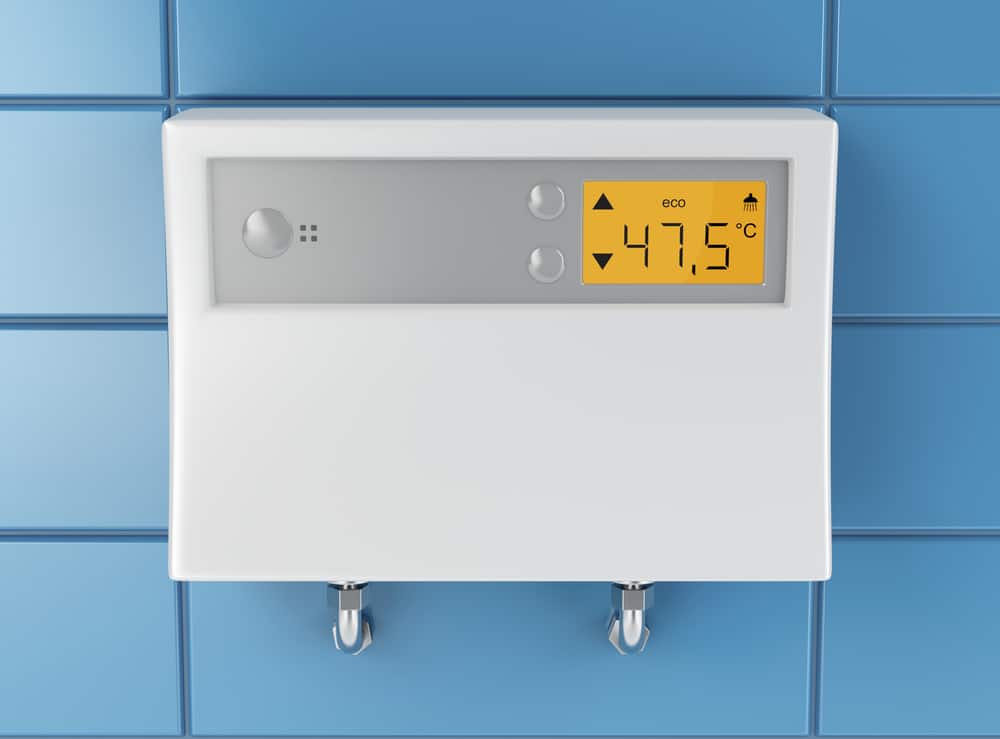
Automatic water heater attached on blue tiled wall
The Environmental and Economical Impact of Tankless Water Heaters
The macro view of tankless water heaters extends beyond personal convenience and cost savings. At a societal level, their adoption could significantly reduce energy consumption and support sustainable living.
Tankless systems lay the foundation for building smarter, greener homes that contribute to a healthier planet.
Sustainable Living with Tankless Technology
The advanced technology powering tankless heaters aligns with sustainable living goals, making them an integral aspect of eco-conscious households.
They support a lifestyle that’s focused on leveraging efficient, energy-saving solutions to minimize our collective impact on the environment.
Tax Incentives and Rebates
Many government and utility programs offer incentives to homeowners who install energy-efficient appliances like tankless water heaters. These incentives can range from tax credits to direct rebates, making the switch even more financially attractive.
In conclusion, the tankless water heater embodies an elegant marriage of efficiency and convenience, making it a worthwhile consideration for homeowners seeking to elevate the functionality, space, and environmental performance of their homes.
If you’re intrigued, don’t hesitate to reach out to professionals who can guide you through this modern heating odyssey.
Whether it’s about navigating the installation process, maintaining your system, or selecting the perfect unit, expert advice can turn your tankless water dreams into a tangible, reliable, on-demand reality. So, why not make the switch today? Your future self and the planet will thank you.
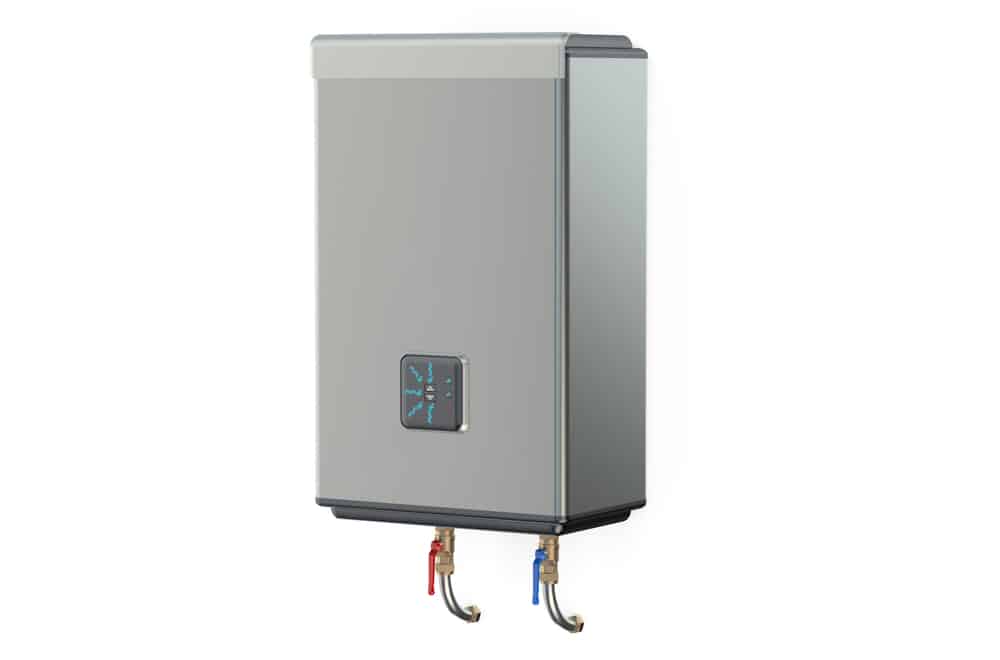
Modern automatic electric boiler, water heater isolated on white background
Tankless Water Heater Installation
If you’re considering the switch to a new tankless water heater, it’s essential to ensure proper installation for optimal performance and efficiency.
We highly recommend using a professional plumber to handle the installation process. Reach out to us at Maryland Sewer and Plumbing! Our team of experienced professionals is well-equipped to provide you with a seamless and reliable installation service.
Whether you’re upgrading your current system or installing a new one, we can help make the transition smooth and hassle-free. Don’t hesitate to contact us and take the first step toward enjoying endless hot water with a tankless water heater.

